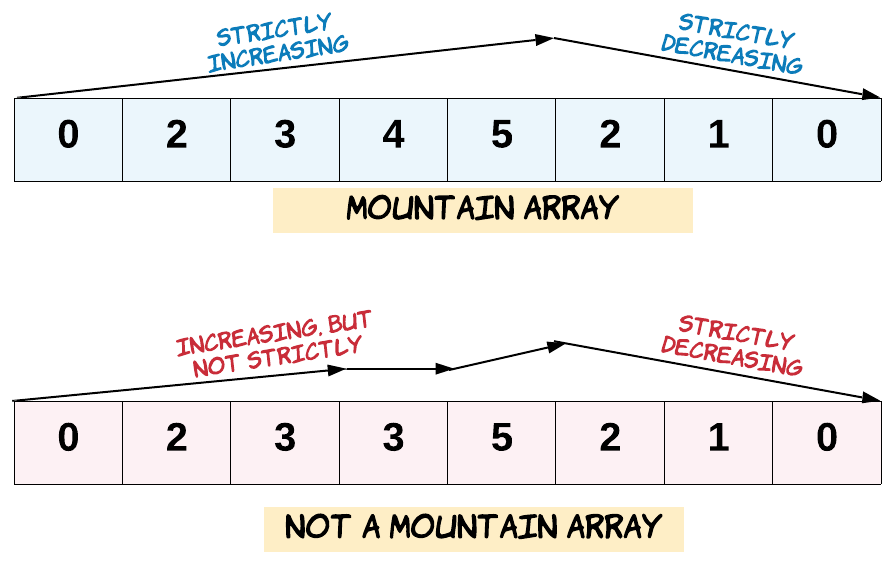| comments | difficulty | edit_url | tags | |
|---|---|---|---|---|
true |
Easy |
|
Given an array of integers arr, return true if and only if it is a valid mountain array.
Recall that arr is a mountain array if and only if:
arr.length >= 3- There exists some
iwith0 < i < arr.length - 1such that:arr[0] < arr[1] < ... < arr[i - 1] < arr[i]arr[i] > arr[i + 1] > ... > arr[arr.length - 1]
Example 1:
Input: arr = [2,1] Output: false
Example 2:
Input: arr = [3,5,5] Output: false
Example 3:
Input: arr = [0,3,2,1] Output: true
Constraints:
1 <= arr.length <= 1040 <= arr[i] <= 104
First, we check if the length of the array is less than false directly.
Then, we use a pointer
The time complexity is
class Solution:
def validMountainArray(self, arr: List[int]) -> bool:
n = len(arr)
if n < 3:
return False
i, j = 0, n - 1
while i + 1 < n - 1 and arr[i] < arr[i + 1]:
i += 1
while j - 1 > 0 and arr[j - 1] > arr[j]:
j -= 1
return i == jclass Solution {
public boolean validMountainArray(int[] arr) {
int n = arr.length;
if (n < 3) {
return false;
}
int i = 0, j = n - 1;
while (i + 1 < n - 1 && arr[i] < arr[i + 1]) {
++i;
}
while (j - 1 > 0 && arr[j - 1] > arr[j]) {
--j;
}
return i == j;
}
}class Solution {
public:
bool validMountainArray(vector<int>& arr) {
int n = arr.size();
if (n < 3) {
return false;
}
int i = 0, j = n - 1;
while (i + 1 < n - 1 && arr[i] < arr[i + 1]) {
++i;
}
while (j - 1 > 0 && arr[j - 1] > arr[j]) {
--j;
}
return i == j;
}
};func validMountainArray(arr []int) bool {
n := len(arr)
if n < 3 {
return false
}
i, j := 0, n-1
for i+1 < n-1 && arr[i] < arr[i+1] {
i++
}
for j-1 > 0 && arr[j-1] > arr[j] {
j--
}
return i == j
}function validMountainArray(arr: number[]): boolean {
const n = arr.length;
if (n < 3) {
return false;
}
let [i, j] = [0, n - 1];
while (i + 1 < n - 1 && arr[i] < arr[i + 1]) {
i++;
}
while (j - 1 > 0 && arr[j] < arr[j - 1]) {
j--;
}
return i === j;
}